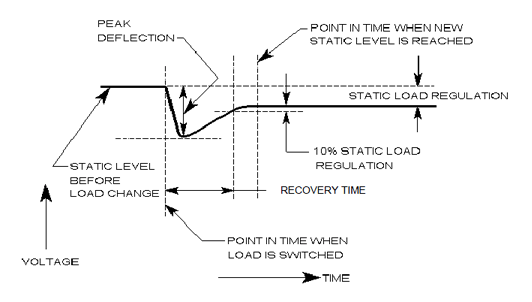Application Notes - High Voltage Power Supplies
High Voltage Power Supply Dynamic Load Characteristics
AN-11
Spellman’s high frequency switching power supplies have minimal output capacitance, inherent by design. Dynamic load changes can quickly discharge output capacitance, causing the output voltage to drop out of static regulation specification. Even if the load step draws current that is within the rated current of the power supply, there may be some “droop” in the output voltage. This droop is sensed by the voltage feedback divider, which in turn causes the voltage loop to command the power supply to increase the output voltage to bring the unit back within static voltage regulation specification. None of this happens instantly, it all take time to accomplish. Typically recovery times for Spellman’s power supplies (when specified and measured) are in the order of individual to tens of milliseconds.
The amount of droop is mostly influenced by the following parameters:
- Capacitance of the power supply’s output section and any external, stray or load capacitance
- Magnitude of load current being drawn from the supply
- Duration of load step event

The voltage recovery waveform time period and overall shape (under damped, over damped or critically damped) are dependent upon the parameters outlined above in addition to the compensation characteristics of both the voltage and current loops of the power supply.
Power Supply Response
Loop compensation values are selected for a variety of performance related specifications like: dynamic recovery, ripple rejection, and overall power supply stability margins. These are all interrelated characteristics and changing loop compensation values to improve one category of performance can adversely affect another. Spellman generally stresses overall power supply stability and ripple performance when selecting loop compensation values for our standard power supplies, as typically there are no dynamic performance specifications listed. If specific dynamic load recovery characteristics are required, then that unique unit must be built with testing performed in Engineering to establish baseline specifications as a starting point as what may be able to be accomplished on a custom basis.
When customers do inquire about dynamic load recovery specifications it is important we understand the exact nature of the application. Additionally we need to understand just how the dynamic load response is being measured and specified. Typically a 10% to 90% voltage recovery time is specified, along with a percentage of maximum rated voltage overshoot allowable. Other methods are acceptable as long as both Spellman and the customer are consistent in how things are measured and specified.
Making these types of dynamic load response measurements can require specialized test equipment; like dynamic load fixtures that can electronically pulse the load on and off so the voltage recovery response waveforms can be obtained. Depending upon what the power supply’s output voltage, current and power capability is, fabricating this type of dynamic load test fixture can range from inexpensive and reasonable in difficulty; to prohibitively expensive and a very, very complex Engineering task.
If you have specific power supply dynamic load response requirements please provide these needs in your initial inquiry, understanding our standard catalog products have no advertised dynamic performance specifications. Spellman’s Engineering team will evaluate your requirements and advise what kind of hardware solution we may be able to provide.




